Not all workers have a new, upbeat (or worrisome) season of fresh opportunity come the fall, but for those in education or church work, at least, it sure seems like the turn of the calendar into the fall is something like a new year. Fresh starts, new programming, hopeful feelings about good efforts in the works. Some of us leave the dog days of summer with new commitments about commitments, our prayer lives, our reading habits, our dedication to service projects, our church involvement, or whatever. Welcome to the club. Here we are.
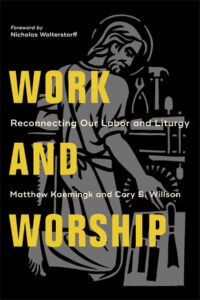 (I often dedicate the Labor Day weekend BookNotes to reflections on books about work but, to be honest, hardly anybody buys them, so I’m going to skip that this weekend, but hope that in church you participate in liturgies and sermons on work. If not, you and your church leaders need this, right here.)
(I often dedicate the Labor Day weekend BookNotes to reflections on books about work but, to be honest, hardly anybody buys them, so I’m going to skip that this weekend, but hope that in church you participate in liturgies and sermons on work. If not, you and your church leaders need this, right here.)
I am of two — or several — minds when it comes to leadership theories and leadership books. I read them and I like them. I don’t know in what ways I’m a leader — I think I am not, really — but I get inspired reading about offering a witness of integrity and influence among others. Whether at work — where most of us spend most of our time — or in para-church ministry or congregational service, almost everybody can benefit from some time spent reading about leadership. Let us know if you want some basic ones for ordinary folks.
For some, leadership is serious business. Really serious. And some of the books that they’ve produced are important.
I’ll tell you about one recent one that is one of the most serious and provocative and detailed studies on leadership theory I’ve read in recent years. And then I’ll follow up that review with another amazing book from the same indie publishing house. If you read leadership books, especially for congregational and para-church ministry, JR Woodward’s new Scandal of Leadership is a must. In fact, I’d say that even if you are not a formal leader in your church, but you care about leadership in the congregation, you should explore this one. It’s hefty, but exceptional. I enjoyed working through it a lot.
I also enjoyed the new one by Alan Hirsch, JR’s associate in visionary missional work, called Metanoia but we’ll get to that. They are, I think, connected. They are quite a duo to pair this month. Happy September!
 The Scandal of Leadership: Unmasking the Powers of Domination in the Church JR Woodward (100 Movements Publishing) $26.99 OUR SALE PRICE = $21.59
The Scandal of Leadership: Unmasking the Powers of Domination in the Church JR Woodward (100 Movements Publishing) $26.99 OUR SALE PRICE = $21.59
I’ve hinted already that this is an important book on leadership, if a bit limited to congregational leadership. For the record, God’s Kingdom is coming in all areas of life and as you well know, we don’t specialize here in books only on the church or professional clergy types. We need an all-of-life-redeemed wholistic vision which honors and equips Christians to be salt and light and leaven in the loaf of their various spheres of influence, at work, in school, in the neighborhood or nursing home, in the lobby, library, or late-night lounge. But leadership in the arts and sciences — although JR wouldn’t disagree — isn’t the focus of this book, but the insights surely can frame thinking about leadership (and dangerously bad dysfunctional leadership) in all zones of life. It is a book about church life, but is so wise and profound, it’s good for anyone, leading (or following) in any sphere or institution or organization. Okay?
There are a few vital things to know about Scandal of Leadership that I’ll list, making this review a bit less charming, perhaps, but hopefully clear. I want you to know what it is about so you can determine if you need it (or if you need to buy it for a friend, pastor, missionary, or person you may know.)
FIRST. It seems to me that this book is mostly a PhD dissertation, perhaps gussied up a bit for popular readership, but it is, for better or worse, a scholarly tome with lots of fabulous and provocative rabbit holes and tangents and excursions. These are helpful, carefully arranged to make important points and he circles back to the primary narrative, over and over. So it’s just a good, serious, fairly dense study, covering this, that, and the other. It’s a Hobbit journey, there and back again. You’ll want to spend some time with it, and you’ll want to take notes. And you’ll be richer for it, believe me, even if it might have been popularized just a bit. That said…
SECONDLY. Ahh, how to say this without pigeonholing the book? I’ll just blurt it out, as the sub-title hints and as the back cover states boldly: it is about abusive leaders, dysfunctional leaders, about domineering and domination systems, about sin and scandal.
Please don’t think, well, that’s a problem in some unfortunate churches, but not in my church. Maybe not. But this book, still, is remarkably profound and good for anyone.
The title of the book is a doubly-whammy play-on-words, I think: there is the scandal of Christian leadership these days — you’ve heard of the macho wack job out at Mars Hill and you’ve heard of the shady millionaire televangelists, disgraced, the cover ups and the weirdness; even seemingly good pastors swept up in disconcerting patterns of abuse and pride — but there is also the scandal (to use a Biblical phrase) of the gospel itself. There is a righteous way to be a scandal as we imitate the “scandalous way of Christ.” That is really what this book is about, countering the tragic scandals that have hurt so many (and turned many folks away from the gospel and away from church) with the scandal of the upside down Kingdom where following Jesus flips the script and redeems even the most awful human realities.
This is the heart of the book, developing common sense, Biblical approaches to leadership as expressed by the likes of Eugene Peterson, say, or spelled out systematically in Arthur Boer’s powerful Servants and Fools: A Biblical Theology of Leadership. One of his big themes (and this is rich and serious) is showing how missional leadership must be rooted in a practice of imitation.
THIRDLY. If you’re aware of some of the philosophical literature about all this you’ll guess where this is going (if not, I don’t blame you; I am unschooled in this myself.) For Woodward, at least in this book, he finds the language from Rene Girard (“mimetic theory”) as a way to open up the Biblical mandate to imitate Christ. He has two strong chapters in Section Three — one of those big rabbit trails I mentioned — that are worth the price of the book for those who need a clear and useful appropriation of Girardian theory. It offers (as he puts it in another chapter) a “theology remedy” pushing us towards the scandalous practice of our imitation of the crucified Lord.
But why dig so deep for such admittedly heady tools to understand our call to serve others by following Christ? Haven’t pastors always had this pretty simple — if difficult — vocation and task? On one hand, sure. Obviously. Lucky you if your pastor is good at it and is helping her flock in the ways of Jesus.
However, this secular age, and the facts of the eroded sense of authority and the nature of twenty-first century institutions and the challenges of modern leadership make pastoring well — let alone leading multi-staffed congregations, multi-site churches, Kingdom groups, para-church ministries, mission teams, and Christian organizations — that much more difficult. We live in dizzying times and while I tip my hat to my favorite pastors who try to imagine their work in simple Peterson-esque ways, the forces and expectations of robust (and often conflicted) organizations make it harder than ever. JR gets this. His own leadership capacities have been shaped in the trenches of missional church organizations, edgy church planting, fresh expressions of Kingdom communities, and consulting with bunches of creative church types. He has seen some things. And he’s done his homework.
(That he doesn’t deal with the important set of books on ministry, church leadership, pastoring all in “the secular age” by Andrew Root — there is yet a new one coming soon! — is unfortunate.)
FOURTH. This third feature (the nature of the times and how they impinge on even the best leaders) leads me to the fourth big point that makes The Scandal of Leadership utterly essential for anyone serious about reading well in the leadership genre. This book not only says — as the best do, these days — that times are more complicated and we must nurture a deeper spirituality (that is, the interior lives of the sustainable leader and his or her character, below the surface) and the capacities for adaptive change and such (the skills of “canoeing the mountains” as Tod Bolsinger puts it.) It also says that there are what the Bible calls “principalities and powers” that have deformed (demonically, perhaps) the very structures in which we lead and serve. Whoa! This is new in leadership studies.
You see, we can be people of great depth and have great, congenial skills for adaptive change the the like, and we may be fully aware that times are tough and we can be a non-anxious presence in our organizations, but — damn! — things are not just hard and they are not just broken, they are captured, tyrannized, occupied; demonic.
To explore this serious state of affairs, Woodward studies the best theologians who have grappled with the provocative texts about what the Bible calls the principalities and powers. Hendrikus Berkof, of course. Yoder. Marva Dawn. Obviously, he interacts with Walter Wink; it has been a while since anyone (let alone a vibrant evangelical) has worked with Wink’s remarkable teaching — Naming, Engaging, Unmasking the evil powers. As I mentioned, Woodward draws on Rene Girard. And, surprisingly (and a delight for me, since I’m a fan of this under-appreciated scholar and activist) he uses William Stringfellow as a conversation partner. (Ya gotta love scholarly dissertations, eh? Who woulda thunk a modern, missional evangelical would introduce us to this radical Episcopal lawyer of Block Island?) Hooray for this important trio of important thinkers (Wink, Girard, Stringfellow) who engaged the powers in their own heroic lives and who become vital teachers for JR.
The Scandal of Leadership brilliantly puts all of this — the deeper diagnosis on why we have an epidemic of failed leaders and failing church structures — in conversation with the near classic literature on the missional church and on contemporary missional leaders. From Darrell Gruder to Craig Van Gelder to David Fitch, from Roxburgh and Romanuk to Goheen and Newbigin, he knows the best books and authors and shows much fluency in bringing each into the evolving discussion. He is laying out his argument in organized fashion, building from why we need missional leaders to where it all went wrong to what we can do about it.
 Chapter Three is called “Domineering Leadership in the First-Century Church” which illustrates that this problem of failing leaders is not new. He cites everybody from Bonhoeffer to N.T Wright to James K.A. Smith to Alan Kreider and helps us understand so much. It may be different in our post/hyper-modern culture, and the church is not what it once was, but as that excellent chapter shows, questions of misshaped desire (and the “subversive work of the powers”) are perennial. And one thing the ancients had that we do not is a cosmic or mythical sense of the Powers. He shows that all of this is a “hermeneutical challenge.” We have some work to do.
Chapter Three is called “Domineering Leadership in the First-Century Church” which illustrates that this problem of failing leaders is not new. He cites everybody from Bonhoeffer to N.T Wright to James K.A. Smith to Alan Kreider and helps us understand so much. It may be different in our post/hyper-modern culture, and the church is not what it once was, but as that excellent chapter shows, questions of misshaped desire (and the “subversive work of the powers”) are perennial. And one thing the ancients had that we do not is a cosmic or mythical sense of the Powers. He shows that all of this is a “hermeneutical challenge.” We have some work to do.
Whenever a book is published by an indie-press you can expect some eccentric touches. There are a few more graphs and charts than a typical publisher might have allowed. He uses phrases like “leadership matrix” and brings up some obscure articles (the Ford/Frei Scale). At moments, it seems a bit much; the print is a nice size and there are beautiful graphic design touches, but, well, it’s a big book, filled with a whole lot.
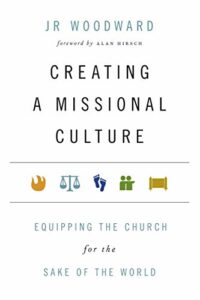 And most of it is very good. Is there a new way of “being and belonging”? Can we embrace being scandalized not by foolish abuse of power but by imitating the One who was himself a scandal? Is that how we subvert and resist the Powers? There is no other book that asks these kinds of questions about the ubiquitous task of leadership. I have a few small complaints, but, man, this is a leadership book unlike any I’ve ever seen. Theologically rich, culturally profound, spiritually alive, systematic and visionary, both, JR Woodward has given us an amazing, near masterpiece. It shouldn’t surprise, us, really. I raved about his excellent IVP volume produced with Forge, Creating a Missional Culture: Equipping the Church for the Sake of the World. (IVP; $25.00; OUR SALE PRICE = $20.00.)
And most of it is very good. Is there a new way of “being and belonging”? Can we embrace being scandalized not by foolish abuse of power but by imitating the One who was himself a scandal? Is that how we subvert and resist the Powers? There is no other book that asks these kinds of questions about the ubiquitous task of leadership. I have a few small complaints, but, man, this is a leadership book unlike any I’ve ever seen. Theologically rich, culturally profound, spiritually alive, systematic and visionary, both, JR Woodward has given us an amazing, near masterpiece. It shouldn’t surprise, us, really. I raved about his excellent IVP volume produced with Forge, Creating a Missional Culture: Equipping the Church for the Sake of the World. (IVP; $25.00; OUR SALE PRICE = $20.00.)
Check out his stuff near the end of Scandal on “selfless leadership in the praxis of mission” and (in light of 2 Timothy) his riffs on “kenotic living.” He wisely invites us all, and certainly leaders, to the “formation of desire through local exemplary models.” (He explores “distant models”, too, which I liked a lot and is necessary for many of us.) We can learn the way of “humble obedience” which, as JR shows, is actually revolutionary. To make the point he writes a bit about Oscar Romero! He offers vivid, practical teaching, even as he opens up the Scriptures with the help of a rising batch of Biblical scholars, from Nijay Gupta to Timothy Gombis, and older scholars like Sarah Coakley. What a book!
If you aren’t sure of my recommendation, consider these, just three of the many who have raved:
This book is a sensation! Every Christian leader should read this. — Michael Frost, Keep Christianity Weird: Embracing the Discipline of Being Different
This deep spiritual investigation will disrupt the forces of domineering leadership and help us name our temptations, transforming us from the inside out and restoring integrity to individuals and systems and to our missions. — Mandy Smith, The Vulnerable Pastor and Unfettered
The Scandal of Leadership is not a screed but rather an engaging exploration of leadership for Christian communities. Churches and other Christian organizations would do well to read and engage with Woodward’s analysis — Dennis Edwards, Might from the Margins: The Gospel’s Power to Turn the Tables on Injustice
 Metanoia: How God Radically Transforms People, Churches, and Organizations from the Inside Out Alan Hirsch with Rob Kelly (100 Movements Publishing) $19.99 OUR SALE PRICE = $15.88
Metanoia: How God Radically Transforms People, Churches, and Organizations from the Inside Out Alan Hirsch with Rob Kelly (100 Movements Publishing) $19.99 OUR SALE PRICE = $15.88
I’m a big fan of Alan Hirsch and hopefully many of our readers will think of his many books on vibrant wholistic discipleship, cultural analysis, the missional church, and upbeat books about leadership and change. While he isn’t the same (he’s Australian, for starters) as the every-witty and often brilliant semiotic evangelist, Len Sweet, there are some similarities — beside the penchant for clever wordsmithing, there’s the deep stuff made accessible, his connecting the dots of culture and social trends, his beautiful loyalty to the church of Christ even if serving as a contemporary prophet calling God’s people to more relevant faithfulness. I guess he’s an organizational consultant or praxis leader or something with some cool letters and one-man, live missional incubator, and, like Sweet, Hirsch calls us over and over — in the context of the cool cultural studies — to love God by following Jesus in the power of the Holy Ghost. In this, Hirsch is unflinching and steadfast. He combines philosophy and theology, Biblical studies and spirituality, social and political evaluations, in a way to help us rethink “unfruitful patterns and systems” so we can “experience the person, church, and organizational transformation we so desperately desire.” When he talks about transformation, he’s not kidding around.
His buddy JR Woodward’s book — which, similarly is a wild ride covering lots of ground and released by their hybrid publishing ministry — is easier to place in our store, though. It goes under congregational leadership. Got it.
Hirsch, though, is bursting at the seams a bit more, making his book about any number of things. It is about spirituality and formation, about discipleship and service, about church life, and about how serious transformation will lead to significant change in our lives and lifestyles, in our work and goals, in our organizations and institutions; it’s about social reformation. Hooray for books that are hard to pigeon-hole and hooray for interdisciplinary authors who don’t “stay in their lane.”
Yet, despite the breathy passion for understanding big things and despite the many fruitful pages exploring the nature of real change — inside out, personal spiritual transformation that bears fruit in galvanizing and mobilizing missional networks and movements for reformation and renewal — the thesis of the book is fairly focused. In a foreword by the important Dennae Pierre (she of Redeemer City to City) and in Alan’s own preface, they suggest that this book is ground-breaking, radical, vital, new, needed. This might seem a bit presumptuous, but I get it; in most of the churches I know about there is to be found one of two general vibes — a certain sort of lifelessness, as if they are good folks trusting God, but still nearly in the ho-hum doldrums or a certain sort of peppy enthusiasm that seems almost a caricature of Biblical zeal, as if they have to keep on the happy face and keep the juggled plates from fallen because, well, ye gads, if we stop, if we ever stop, who knows what will happen.
Into these kinds of institutional cultures and churchy attitudes, we need a word from God, a true truth that can be grace-giving, healing, and yet transformative, empowering. The Biblical word for all of this, as Hirsch and his co-author Rob Kelly (who serves as a catalyst for city networks that “unite the church for the flourishing of cities” and who works for the Charlotte Network and the City Leaders Collective) point out over and over, is the greek word metanoia. It means something like to change one’s mind, but also to turn around, to change one’s direction. It was a word used in Greek and Roman culture and was often on the lips of our Master. If we are serious about following Jesus, we have to come to terms with all that is implied (indeed all that is expected and promised) with this notion of metanoia. What’s a first century paradigm shift mean for us today?
As the authors plumb the depths of this realignment, we learn a lot. Even if you have studied the kind of words related to this born-again phrase — words like repentance, say — I am sure that you will find much of this jam-packed volume quite compelling. I sure did. For what it is worth, I’m confident that many of us across the theological and congregational spectrum, have some confusion about the radical nature of the paradigm shift and reorientation that “invites us to perceive the world through God’s eyes” which can bring about “transformation in our own lives, the organizations we lead, and the world around us.” We need this book on repentence and change and, well, metanoia.
You know this is going to be a wild ride when the first chapter (under the section “Why Metanoia” starts with the title, “The Apocalypse of the (Ecclesial) Soul: Glimpses into the Problems and Potentials of the Church.” You may not fully resonate with his evaluation of churches (and what kind of churches he is referring to) but mostly, you’ll know in your gut that he’s speaking truth. We indeed need — as the next chapter puts it — “the spiritual art of re/turning and re/tuning.” One might think Len Sweet came up with that bit of clever wordplay. It’s an important chapter that lays out a lot of important terms and you won’t want to miss it.
I love the later chapter that calls us to a “Christo-logic” which “sees the world from inside the mind that created it.” Oh my. His later reflection on what some might call epistemology (how we know) points us towards what he calls wholeheartedness — activating the mind, soul, and will (and, he’d say, too, I’m sure the body.) This is rich.
 Hirsch has written before about this re-orienting paradigm shift that affects all that we are and all that we do and the way in which inward conversion leads to our influencing transformed churches and organizations. In a sense, Metanoia is a sequel to the very lively book co-written with our friend Mark Nelson (that I raved about at BookNotes) called Reframation: Seeing God, People, Mission Through Reenchanted Frames. In fact, in the opening “briefing for the (metanoic journey” that opens the new Metanoia book, Hirsch mentions this previous book. With the “ideological swirl” of the Trump years and the implications of the global pandemic, now, he thinks, the notion of a conversion to see through a Jesus-lens, is as urgent as ever.
Hirsch has written before about this re-orienting paradigm shift that affects all that we are and all that we do and the way in which inward conversion leads to our influencing transformed churches and organizations. In a sense, Metanoia is a sequel to the very lively book co-written with our friend Mark Nelson (that I raved about at BookNotes) called Reframation: Seeing God, People, Mission Through Reenchanted Frames. In fact, in the opening “briefing for the (metanoic journey” that opens the new Metanoia book, Hirsch mentions this previous book. With the “ideological swirl” of the Trump years and the implications of the global pandemic, now, he thinks, the notion of a conversion to see through a Jesus-lens, is as urgent as ever.
I love the practical tone of the second portion, but it’s still some fun, wild stuff. The last half is about “learning to unlearn to relearn” (yes, let that sink in) and the last three chapters are entitled:
- Paradigm: Blowing the Collective Mind
- Plat/formed: Shaping the Collective Soul
- Practice/s” Engaging the Collective Will
Our brave authors suggest that we have to work this out in our own place and context, but creating opportunities to nurture real encounters with God — not just talking about God — is foundational. Out of our raw encounter with the Holy One, we will be transformed and called into metanoia and the ongoing work of “reframation.” They note that it is sort of like those “choose your own adventure” books. God is with us. God will transform us. We can then transform the world. Carry on.
The endorsements recommending this are mighty. Here are a couple:
Compelling, hopeful, and unflinching, Metanoia is a masterful book that every Christian leader should read. — Lisa Rodriguez-Watson, national director Misso Alliance
This book is a master class, a philosophical tour de force — a profound, transformative, and luminous work. — Brian Sanders, The 6 Seasons of Calling: Discovering Your Purpose in Each Stage of Life
This book is inviting people to open their minds and soften their hearts to receive the precious, life-altering, beautiful, good news of Jesus. — Danielle Strickland, The Other Side of Hope: Flipping the Script on Cynicism and Despair and Rediscovering Our Humanity
The church is living in the midst of a tectonic shift in American religion. Needed more than ever is a theology for navigating this cultural paradigm shift. This book provides a theology for embracing change through a biblical analysis of metanoia. This is an essential read for aspiring church-based change makers. It is both inspirational and practical, while maintaining missional faithfulness This is a book about hope, not despair. — Dr. David John Seel, The New Copernicans: Millennials and the Survival of the Church
+++
While we’re thinking about big books about serious Kingdom transformation, organizational change, leadership and the like, I’ll quickly remind you of just four other great reads (one brand new this week) that I think would help equip anyone — and certainly church leaders — to be about God’s work in God’s ways. Each of these are very good reads. Here ya go:
 Pivot: The Priorities, Practices, and Powers That Can Transform Your Church into a Tov Culture Scot McKnight & Laura Barringer (Tyndale Elevate) $22.99 OUR SALE PRICE = $18.39
Pivot: The Priorities, Practices, and Powers That Can Transform Your Church into a Tov Culture Scot McKnight & Laura Barringer (Tyndale Elevate) $22.99 OUR SALE PRICE = $18.39
One of the truly lovely and happily much-discussed books of the last few years around cultivating healthy, Christ-like church cultures was 2020’s A Church Called Tov: Forming a Goodness Culture That Resists Abuses of Power and Promotes Healing by Scott McKnight & Laura Barringer. (“Tov” is, we learned, a Hebrew word suggesting goodness and beauty and health.) What would a church shaped by “tov” look like? How might this “goodness” concept help us resist toxic cultures and abusive leaders? It was, in many ways, groundbreaking and a great read.
Now, here, we have a practical guide to help you build a culture in your church or organization that resists abuse and cultivates goodness. This is, as Danielle Strickland puts it, a “prophetic invitation to move.” It is a guide, a manual, an imaginative conversation starter and practical stimulant. There is wisdom and clarity and tons of helpful checklists and insightful ideas to help actually process the Church Called Tov book and initiate change in our congregation or workplace. There are lots of case studies and examples of church leaders who pivoted. There are good discussion questions at the end of each section. Pivot shows leaders how to unleash a culture of goodness in their ministry. And, yes, it offers insights for readers who sense something wrong in the culture of the congregation of which they are a part. This is a fabulous resource, for all of us. It’s highly recommended.
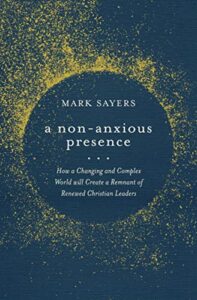 A Non-Anxious Presence: How a Changing and Complex World Will Create a Remnant of Renewed Christian Leaders Mark Sayers (Moody Press) $15.99 OUR SALE PRICE = $12.79
A Non-Anxious Presence: How a Changing and Complex World Will Create a Remnant of Renewed Christian Leaders Mark Sayers (Moody Press) $15.99 OUR SALE PRICE = $12.79
Our younger readers, at least, who pay attention to podcasts like the one Sayers used to do with John Mark Comer (This Cultural Moment) and the one he now co-hosts called Rebuilders, most likely know the hyper-cool Sayers has this recent book out. Others may need to be reminded — he is a prolific and somewhat edgy cultural critic, non-nonsense, full of stories and hope, offering insight about the nature of our times, our worldviews, our social trends, and offering faithful pointers for navigating these times, such as they are. I love his thinking (and how accessibly he writes, making often complicated stuff pretty fun.)
In this, Sayer’s suggests that history shows that renewal is often preceded by crisis. And we are in a current epoch-changing crisis — a shift away from technocratic solutions and pragmatic policies and trust in vision-casting and planning and execution. There are great weaknesses to these “supposedly solid strategies” which bring to light myths and idols we maybe didn’t even know we had.
This is a book of hope, showing how individuals and corporate renewal can happen, especially if we change our posture, our relationship to the world, our own capacity to move from our comfort zones into adaptive change. It’s a sweet and solid little book.
Listen to what our friend Tish Harrison Warren — author of the brand new little volume Advent — says; she’s read it carefully and commends it to you:
Mark Sayers has a unique and profound ability to understand culture and, in particular, our cultural moment — how we got here, where we are going, and how Christians might seek to live faithfully amid the tectonic shifts of our age. In A Non-Anxious Presence, Sayers casts a vision for pastors and other Christian leaders that allows us to offer hope in a quickly changing and ever-anxious world. Sayers vividly describes the disorienting ‘gray zone’ we now find ourselves in, as well as helpfully interpreting this cultural shift as a ‘wilderness’ of testing in which leaders are called to be refined and purified as we seek the presence of God in our world, our churches, and our lives. Sayers is a faithful, studied, and remarkably insightful guide in this time of upheaval and transition, a time where we find ourselves often befuddled and fearful, a time when God is yet at work redeeming all things. –Tish Harrison Warren, author of Liturgy of the Ordinary and Prayer in the Night
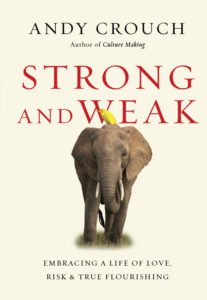 Strong and Weak: Embracing a Life of Love, Risk & True Flourishing Andy Crouch (IVP) $18.00 OUR SALE PRICE = $14.40
Strong and Weak: Embracing a Life of Love, Risk & True Flourishing Andy Crouch (IVP) $18.00 OUR SALE PRICE = $14.40
I could write about this at length — and I have — but the short version is that, like all of Mr. Crouch’s eloquent books, it is a must read. He did a major work — one of our most regularly recommended titles in the last 15 years — called Culture Making: Recovering Our Creative Calling (look for a new updated edition very soon; we’re taking pre-orders!) which was followed up a few years laster by one of the very best books ever done on the notion of power. (It is a must-read for culture-makers, entitled Playing God: Redeeming the Gift of Power.)
I don’t recall if I’ve heard Andy say this, but it is my sense that this nicely-done compact paperback came out of his reflections on the book about power. In a way, it is a case study, a short and provocative look at ways to make a difference by embracing our weaknesses, aligning ourselves with the Christ who suffers, and moving from too much power (or power poorly stewarded) to give ourselves away in trust and vulnerability. It is good for anyone, of course, who wants to live a free life, a life of abandon, following the Lord Jesus in culturally helpful ways. But it is exceptionally poignant for leaders. The title and subtitle don’t directly allude to leadership but if Woodward and Hirsch are right that we need a converted vision, a paradigm shift about leadership, this graciously thoughtful book is going to be very, very helpful. Beth and I commend it often.
The publishers summarize it nicely:
Two common temptations lure us away from abundant living — withdrawing into safety or grasping for power. True flourishing, says Andy Crouch, travels down an unexpected path — being both strong and weak. Regardless of your stage or role in life, here is a way of love and risk so that we all, even the most vulnerable, can flourish.
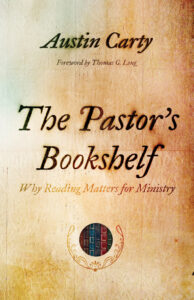 The Pastor’s Bookshelf: Why Reading Matters for Ministry Austin Carty (Eerdmans) $19.99 OUR SALE PRICE = $15.99
The Pastor’s Bookshelf: Why Reading Matters for Ministry Austin Carty (Eerdmans) $19.99 OUR SALE PRICE = $15.99
Again, this is a book I’ve highlighted time and again, and have done live announcements about whenever I’ve been with (live or over zoom) clergy this past year. I do not tire of promoting it, enjoy gushing about it, and will continue to express how grateful I am for Carty’s lively prose, visionary reading plan, and incredibly wise (and fun) stories about growing into a love for reading.
I know. For busy pastors, as it says on the back, “time spent reading feels hard to justify, especially when it’s not for sermon prep.” Right?
But what if reading felt less like a luxury and more like a vocational responsibility — a spiritual practice that bears fruit in every aspect of ministry?
I am so sure this will benefit you and that you will enjoy it that, besides offering our 20% off discounted price, I will offer an unconditional guarantee. If you don’t love this book, we’ll give you your money back. (I was going to say “no questions asked” but that may not be true. I’d love to hear it if you don’t appreciate this book.) How’s that? It’s on sale but if it isn’t as great as I’ve often said, we’ll refund your dough. I want to get this book out there, cultivating and spreading a love of books and the value of book buying, even. I think Karen Swallow Prior is right when she says that “pastors who read and live by the wisdom of this book will be changed, as will their ministries and the people to whom they minister.”
As the exquisite neurologist and scholar of reading, Maryanne Wolf (of the great Reader, Come Home), wrote:
I am gobsmacked by this book’s three-fold beauty, its writing, its erudition, and the author’s deep commitment to what true reading can give not only pastors, but us all.
+++
TO PLACE AN ORDER
PLEASE READ, THEN SCROLL DOWN AND CLICK ON THE “ORDER HERE” LINK BELOW.
It is helpful if you tell us how you want us to ship your orders.
The weight and destination of your package varies but you can use this as a quick, general guide:
There are generally two kinds of US Mail options (who just raised their rates again) and, of course, UPS. If necessary, we can do overnight and other expedited methods, too. Just ask.
- United States Postal Service has the option called “Media Mail” which is cheapest but can be a little slower. For one typical book, usually, it’s $4.12; 2 lbs would be $4.87.
- United States Postal Service has another option called “Priority Mail” which is $8.50, if it fits in a flat-rate envelope. Many children’s books and some Bibles are oversized so that might take the next size up which is $9.20. “Priority Mail” gets much more attention than does “Media Mail” and is often just a few days to anywhere in the US.
- UPS Ground is reliable but varies by weight and distance and may take longer than USPS. We’re happy to figure out your options for you once we know what you want.
If you just want to say “cheapest” that is fine. If you are eager and don’t want the slowest method, do say so. It really helps us serve you well so let us know. Just saying “US Mail” isn’t helpful because there are those two methods, one cheaper but slower, one more costly but quicker. Which do you prefer?
BookNotes
SPECIAL
DISCOUNT
20% OFF
ALL BOOKS MENTIONED
+++
order here
this takes you to the secure Hearts & Minds order form page
just tell us what you want to order
inquire here
if you have questions or need more information
just ask us what you want to know
Hearts & Minds 234 East Main Street Dallastown PA 17313
read@heartsandmindsbooks.com
717-246-3333
Sadly, as of August 2023 we are still closed for in-store browsing. COVID is not fully over. Since few are reporting their illnesses anymore, it is tricky to know the reality but the best measurement is to check the waste water tables to see the amount of virus in the eco-system. It is bad; worse than it was two years ago, even. It’s important to be aware of how risks we take might effect the public good as those at risk, while not dying from the virus, are experiencing long-term health consequences. (Just check the latest reports of the rise of heart attacks and diabetes among younger adults, caused by Covid.) It is complicated, but we are still closed for in-store browsing due to our commitment to public health (and the safety of our family, staff, and customers.) Our store is a bit cramped without top-notch ventilation, so we are trying to be wise. Thanks for understanding.
We will keep you posted about our future plans… we are eager, but delayed, for now.
We are doing our curb-side and back yard customer service and can show any number of items to you if you call us from our back parking lot. It’s sort of fun, actually. We are eager to serve and grateful for your patience as we all work to mitigate the pandemic. We are very happy to help, so if you are in the area, do stop by. We love to see friends and customers.
We’re happy to ship books anywhere.
We are here 10:00 – 6:00 EST / Monday – Saturday. Closed on Sunday.

